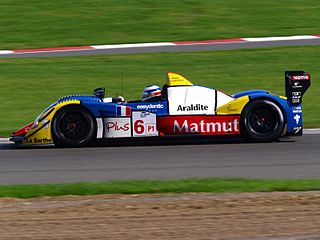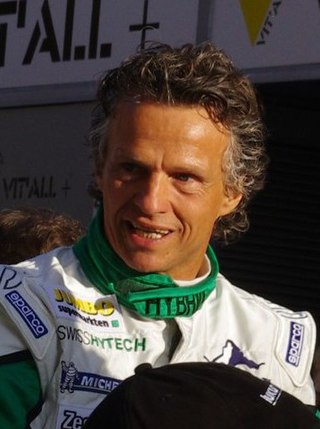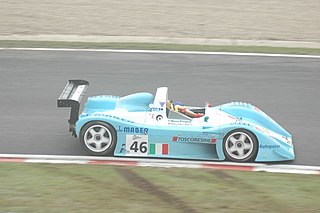
Sports car racing is a form of motorsport road racing which utilises sports cars that have two seats and enclosed wheels. They may be either purpose-built sports prototypes which are the highest level in sports car racing or grand tourers based on road-going models and therefore, in general, not as fast as sports prototypes. Sports car racing is one of the main types of circuit auto racing, alongside open-wheel racing, touring car racing and stock car racing. Sports car races are often, though not always, endurance races that are run over particularly long distances or large amounts of time, resulting in a larger emphasis on the reliability and efficiency of the car and its drivers as opposed to outright car performance or driver skills. The FIA World Endurance Championship is an example of one of the best known sports car racing series.

Dallara Group S.r.l. is the largest multi-national Italian race car manufacturer, founded by its current President, Giampaolo Dallara. After working for Ferrari, Maserati, Lamborghini and De Tomaso, in 1972 in his native village of Varano de' Melegari (Parma), he created Dallara Automobili.

A Le Mans Prototype (LMP) is a type of sports prototype race car used in various races and championships, including the 24 Hours of Le Mans, FIA World Endurance Championship, IMSA SportsCar Championship, European Le Mans Series, and Asian Le Mans Series. Le Mans Prototypes were created by the Automobile Club de l'Ouest (ACO). The technical requirements for an LMP include bodywork covering all mechanical elements of the car. As of 2023, there are two classes within Le Mans Prototypes, designated LMP2 and LMP3.

Judd is a brand of racing car engines built by Engine Developments Ltd., a company founded in 1971 by John Judd and Jack Brabham in Rugby, Warwickshire, England. Engine Developments was intended to build engines for Brabham's racing efforts, and became one of the first firms authorised by Cosworth to maintain and rebuild its DFV engines, but has since expanded into various areas of motorsport.
The Alfa Romeo Tipo 33 was a sports racing prototype raced by the Alfa Romeo factory-backed team between 1967 and 1977. These cars took part for Sport Cars World Championship, Nordic Challenge Cup, Interserie and CanAm series. A small number of road going cars were derived from it in 1967, called Alfa Romeo 33 Stradale.

Courage Compétition was a racing team and chassis constructor company now owned by Oreca, based in Le Mans, France, near the Circuit de la Sarthe. It was founded by Yves Courage, a French race driver who ran hillclimbs before founding the company. Following the purchase of Courage by Oreca in 2007, Yves Courage has refounded the company as Courage Technology in 2010, attempting to develop electric racing cars.
The 1966 World Sportscar Championship season was the 14th season of the FIA "World Sportscar Championship" motor racing. It featured the 1966 International Manufacturers' Championship and the 1966 International Sports Car Championship, which were contested between 5 February 1966 and September 11, 1966, over a total of thirteen races. The International Manufacturers' Championship was open to Group 6 Sports-Prototypes and was contested in two engine capacity divisions, P1 and P2. The International Sports Car Championship was open to Group 4 Sports Cars and was contested in three engine capacity divisions, S1, S2 and S3.

The 2003 FIA Sportscar Championship was the third season of FIA Sportscar Championship, an auto racing series regulated by the Fédération Internationale de l'Automobile and organized by the International Racing Series Ltd. It was the seventh and final season of the series dating back to the International Sports Racing Series of 1997. The series featured sports prototypes divided into two categories, SR1 and SR2, and awarded championships for drivers, constructors, and teams in both classes. The series began on 13 April 2003 and ended on 21 September 2003 after seven races in Europe.

The 2002 FIA Sportscar Championship was the second season of the FIA Sportscar Championship, an auto racing series regulated by the Fédération Internationale de l'Automobile and organized by the International Racing Series Ltd. It was the sixth season of the series dating back to the International Sports Racing Series of 1997. The series featured sports prototypes in two categories, SR1 and SR2, and awarded championships for drivers, teams, and manufacturers in each respective category. The series began on 7 April 2002 and ended on 22 September 2002 after six races held in Europe.
The 2001 FIA Sportscar Championship was the inaugural season of FIA Sportscar Championship, an auto racing series regulated by the Fédération Internationale de l'Automobile and organized by International Racing Series Ltd. The series was a continuation of the previous SportsRacing World Cup dating back to 1997. It was open to two categories of sports prototypes, SR1 and SR2, and awarded championships to drivers and teams in each category. A championship for constructors was also established for this season. It began on 8 April 2001 and ended on 16 September 2001 after eight races.

During its history, Alfa Romeo has competed successfully in many different categories of motorsport, including Grand Prix motor racing, Formula One, sportscar racing, touring car racing and rallies. They have competed both as a constructor and an engine supplier, via works entries and private entries. The first racing car was made in 1913, three years after the foundation of A.L.F.A., the 40/60 HP had 6-litre straight-4 engine. Alfa Romeo quickly gained a good name in motorsport and gave a sporty image to the whole marque.
Advanced Engine Research, Ltd. is an auto racing engine manufacturer based in Basildon, Essex, England. Established in 1997, AER has developed winning engines for a number of high-profile international race series in sports car, prototype racing, rallying, touring car, and open wheel racing. They have designed engines derived from road car platforms, but their emphasis is on clean sheet designed engines with a focus on electronics and turbochargers. Their engines have raced in the 24 Hours of Le Mans, the World Endurance Championship (WEC), the European Le Mans Series (ELMS), the IMSA SportsCar Championship, GP3, British Touring Car Championship (BTCC), Nissan/Renault World Series, Grand-Am, Paris Dakar and FIA Sportscar Championship. They have worked with a number of manufacturers including Mazda, Ford, Hyundai, MG/Rover, Nissan, and Toyota. In 2012, AER developed and built Formula One turbo test engines to current rules and in July 2012, AER was chosen as engine partner and supplier to the new GP3 racing series. They currently supply engines for the Indy Lights series.

The Lola B2K/40 was a Le Mans Prototype developed in 2000 by Lola Cars International as a cheaper, smaller, and lighter alternative to the similar Lola B2K/10. Although specifically designed to compete in the SR2 class of the Sports Racing World Cup and Grand American Road Racing Championship, it would later be adapted to the LMP675 and LMP2 classes for the 24 Hours of Le Mans and American Le Mans Series. This design was replaced in 2005 by the Lola B05/40 and would last be used in competition in 2006.

The BMW M1 Procar Championship, sometimes known simply as Procar, was a one-make auto racing series which featured professional drivers from the Formula One World Championship, World Sportscar Championship, European Touring Car Championship, and other international series, using identically modified BMW M1 sports cars. It was created by Jochen Neerpasch, head of BMW Motorsport GmbH, the racing division of automobile manufacturer BMW.

OAK Racing is an endurance racing team specialising in sports prototypes based in Le Mans, France. In 2013 it won the 24 Hours of Le Mans in LMP2 class and the 2013 FIA WEC World Champion drivers and teams on LMP2 class.

The Debora LMP296 was a Le Mans Prototype, built by Debora Automobiles in 1996 for use in the 24 Hours of Le Mans. The car was originally entered with a 2-litre turbocharged Cosworth straight-four engine, but several other engines were used in the car's three-year career. Two cars are known to have been built. In conjunction with the LMP297, the car helped Waterair Sport to the International Sports Racing Series SR2 Team's Championship in 1998. The LMP296 was updated into the LMP299 for 2000.
Picchio Racing Cars is a small Italian racing and road automobile manufacturer, based in the town of Ancarano, Teramo.

The Ligier JS P2 is a racing car designed and built by French manufacturer Onroak Automotive and named in partnership with French former racing driver Guy Ligier. Designed for the Le Mans Prototype 2 (LMP2) regulations, it is intended as a second option to Onroak's Morgan LMP2 that has been competing since 2012. As well as being the first closed-cockpit car offered by Onroak, it is also the first car they designed entirely in-house. The JS P2 debuted at the 2014 24 Hours of Le Mans, and has been campaigned in the FIA World Endurance Championship, European Le Mans Series, Asian Le Mans Series and IMSA WeatherTech SportsCar Championship.

Ligier Automotive, formerly Onroak Automotive, is a French company which designs, manufacturers, and sells racing cars, specifically sports prototypes for various international series. Onroak was founded in 2012 by Jacques Nicolet who split the design, manufacturing, and sales divisions of his OAK Racing team into an independent company. Onroak has since formed an agreement with Philippe Ligier to develop new cars under the Ligier title. On 31 December 2018, it was announced that Onroak Automotive would be rebranded to Ligier Automotive as part of a rebranding and reorganization of Everspeed's automotive assets.

The Lucchini SR2 is a series of sports prototype race cars, designed, developed, and built by Italian manufacturer Lucchini Engineering, for sports car racing, conforming to the FIA's LMP675/SR2 class, and produced between 1999 and 2003.
















